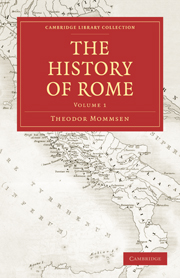Book contents
- Frontmatter
- PREFACE
- PREFATORY NOTE BY THE TRANSLATOR
- EXTRACT FROM DR. MOMMSEN'S PREFACE
- Contents
- BOOK FIRST THE PERIOD ANTERIOR TO THE ABOLITION OF THE MONARCHY
- BOOK SECOND FROM THE ABOLITION OF THE MONARCHY IN ROME TO THE UNION OF ITALY
- CHAPTER I CHANGE OF THE CONSTITUTION.—LIMITATION OF THE POWER OF THE MAGISTRATE
- CHAPTER II THE TRIBUNATE OF THE PLEBS AND THE DECEMVIRATE
- CHAPTER III THE EQUALIZATION OF THE ORDERS AND THE NEW ARISTOCRACY
- CHAPTER IV FALL OF THE ETRUSCAN POWER. THE CELTS
- CHAPTER V SUBJUGATION OF THE LATINS AND CAMPANIANS BY ROME
- CHAPTER VI STRUGGLE OF THE ITALIANS AGAINST ROME
- CHAPTER VII THE STRUGGLE BETWEEN PYRRHUS AND ROME
- CHAPTER VIII LAW. RELIGION. MILITARY SYSTEM. ECONOMIC CONDITION. NATIONALITY
- CHAPTER IX ART AND SCIENCE
- APPENDIX: ON THE PATRICIAN CLAUDII
- ADDITIONS AND CORRECTIONS
CHAPTER II - THE TRIBUNATE OF THE PLEBS AND THE DECEMVIRATE
Published online by Cambridge University Press: 05 October 2010
- Frontmatter
- PREFACE
- PREFATORY NOTE BY THE TRANSLATOR
- EXTRACT FROM DR. MOMMSEN'S PREFACE
- Contents
- BOOK FIRST THE PERIOD ANTERIOR TO THE ABOLITION OF THE MONARCHY
- BOOK SECOND FROM THE ABOLITION OF THE MONARCHY IN ROME TO THE UNION OF ITALY
- CHAPTER I CHANGE OF THE CONSTITUTION.—LIMITATION OF THE POWER OF THE MAGISTRATE
- CHAPTER II THE TRIBUNATE OF THE PLEBS AND THE DECEMVIRATE
- CHAPTER III THE EQUALIZATION OF THE ORDERS AND THE NEW ARISTOCRACY
- CHAPTER IV FALL OF THE ETRUSCAN POWER. THE CELTS
- CHAPTER V SUBJUGATION OF THE LATINS AND CAMPANIANS BY ROME
- CHAPTER VI STRUGGLE OF THE ITALIANS AGAINST ROME
- CHAPTER VII THE STRUGGLE BETWEEN PYRRHUS AND ROME
- CHAPTER VIII LAW. RELIGION. MILITARY SYSTEM. ECONOMIC CONDITION. NATIONALITY
- CHAPTER IX ART AND SCIENCE
- APPENDIX: ON THE PATRICIAN CLAUDII
- ADDITIONS AND CORRECTIONS
Summary
Material interests.
Under the new organization of the commonwealth the old burgesses had attained by legal means full possession of political power. Governing through the magistracy which had now been reduced to subserve their ends, preponderating in the senate, in sole possession of all high offices and priesthoods, armed with exclusive cognizance of things human and divine and familiar with the whole routine of political procedure, taking the lead in the voting of the great electoral assembly and influential in the commons through the number of devoted adherents attached to the various families, and, lastly, entitled to examine and to reject every decree of the community, —the patricians might long have preserved their practical power, for the very reason that they had at the right time abandoned their claim to be the sole holders of legal authority. It is true that the plebeians could not but be painfully sensible of their political disabilities; but undoubtedly in the first instance the nobility had not much to fear from a purely political opposition, if it understood the art of keeping the multitude, which desired nothing but equitable administration and protection of its material interests, aloof from political strife. In fact, during the first period after the expulsion of the kings, we meet with various measures which were intended, or at any rate seem to have been intended, to gain the favour of the commons for the government of the nobility, especially on economic grounds.
- Type
- Chapter
- Information
- The History of Rome , pp. 274 - 295Publisher: Cambridge University PressPrint publication year: 2010First published in: 1862

